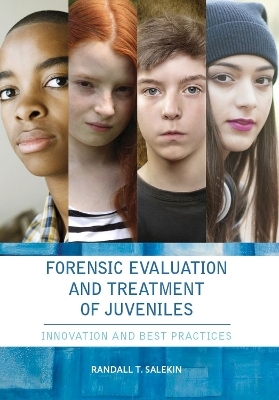
Forensic Evaluation and Treatment of Juveniles
American Psychological Association (Verlag)
978-1-4338-1934-6 (ISBN)
This book provides forensic clinicians with practical strategies for evaluating juvenile offenders and seeking individualized rehabilitation services that will redirect youth to healthier life choices. It highlights five broad areas of juvenile assessment that are essential to any evaluation: veracity in reporting, personality and pathology, risk for dangerous behavior, developmental maturity, and treatment amenability. Readers will also learn how to present assessment data to judges in a thorough and understandable manner while also accounting for local laws and the political climate.
Randall T. Salekin, PhD, is a professor and director of the Disruptive Behavior Clinic at the University of Alabama. He also serves as the Associate Director of the Center for the Prevention on Youth Behavior Problems. Dr. Salekin is an expert in the assessment and treatment of young people with disruptive behavior disorders who are referred from the community or the juvenile court. He provides assessment, treatment, and general consultation recommendations. Dr. Salekin is the author of the Risk–Sophistication–Treatment Inventory (RSTI), one of the primary measures for assessing youth who have come into contact with the law. His research focuses on understanding of the causes and correlates of disruptive behavior in children, including youth with interpersonal callousness (limited prosocial emotion). In addition, his research and practice focus on the treatment of conduct problem young people with interpersonal callous traits. Dr. Salekin's assessment and treatment efforts have been found to be both innovative and effective for youth with oppositional defiant disorders, conduct disorders, and limited prosocial emotion. Dr. Salekin is the author of numerous research publications, the Handbook of Child and Adolescent Psychopathy, and has received both national and international recognition for his work.
Acknowledgments
Introduction
Legal Contexts and More
Juvenile Characteristics, Political and Social Climate, and Transfer
Forensic Mental Health Concepts
Empirical Foundations and Limits of Juvenile Forensic Evaluation
Preparation for the Evaluation and Forensic Practice
Data Collection for Juvenile Evaluations
Interpretation for Juvenile Evaluations
Report Writing and Testimony
Treatment of Young People in the Juvenile Justice System
Conclusion and Future Directions
References
Index
About the Author
| Verlagsort | Washington DC |
|---|---|
| Sprache | englisch |
| Maße | 178 x 254 mm |
| Themenwelt | Geisteswissenschaften ► Psychologie |
| Recht / Steuern ► EU / Internationales Recht | |
| Recht / Steuern ► Strafrecht ► Besonderes Strafrecht | |
| Sozialwissenschaften ► Pädagogik ► Sozialpädagogik | |
| Sozialwissenschaften ► Soziologie | |
| ISBN-10 | 1-4338-1934-1 / 1433819341 |
| ISBN-13 | 978-1-4338-1934-6 / 9781433819346 |
| Zustand | Neuware |
| Haben Sie eine Frage zum Produkt? |
aus dem Bereich


